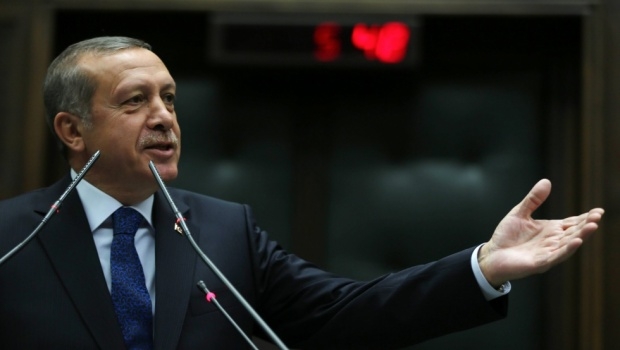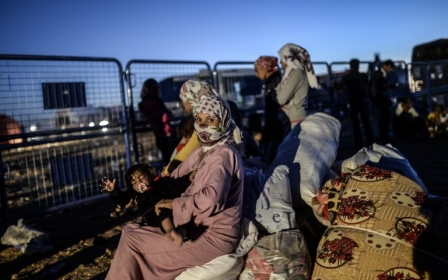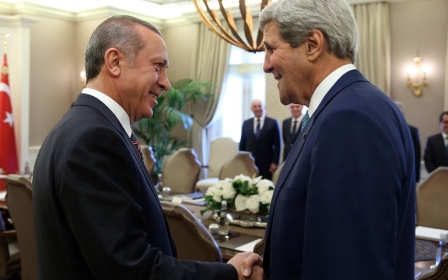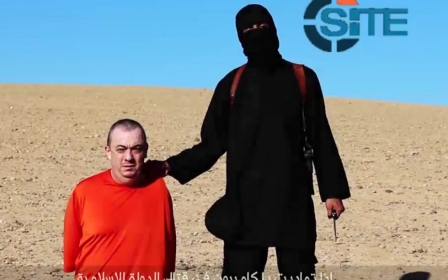Erdogan: UN inaction gives rise to terrorism

The inaction of the UN to the killing of innocent people and military coups is causing despair, distrust and driving many toward terrorism, Turkey’s president said Wednesday.
"Those who stay silent upon the massacre of children, innocent women and the toppling of democratically elected governments with weapons and military vessels are actually taking a part in those crimes," said President Recep Tayyip Erdogan.
"More importantly, this double standard of the modern world creates a deep lack of trust for the people. This distrust tarnishes the perception of justice and leads millions of people to fall in despair," he said.
Erdogan said such despair is the main reason behind international terrorism.
The president emphasised that crises in a number of countries including Iraq, Afghanistan, Egypt, Libya, Palestine, Syria, Ukraine and Yemen are the issues that should concern the UN.
"It is noteworthy that some unjust labels were used for those trying to draw attention to the massacre of the children, women, and even the disabled in Palestine. Those who raised their voices against the murders in Syria and Iraq and against the massacre of democracy in Egypt are also being unjustly labelled and accused of supporting terrorism."
Erdogan cited the deaths of more than 17,000, children in Syria with 375,000 children injured and 19,000 more who lost at least one organ.
In 2014, about 490 children were massacred in the Gaza Strip and 3,000 more injured, under the fire of the most modern artilleries, Erdogan said while adding that Turkey supports a two-state solution in Palestine and the lifting of the blockade on the Gaza Strip.
"No one is innocent in a world where children died and are killed, no one has life security and no one could be in sustainable peace and prosperity," he said.
"The UN should waste no time in pulling its weight for a solution in Syria, Iraq and Palestine."
Erdogan also criticised the current structure of the UN Security Council, where veto-wielding powers are given to only five countries.
"The world is bigger than five. It is unacceptable that only five countries render the U.N. ineffective regarding the developments in the world," said Erdogan, referring to the failure of the Council to place sanctions on the Syrian regime and for not finding a solution in Palestine where more than 2,000 people were killed in 51 days of Israeli attacks.
Russia, the staunchest ally of the Bashar al-Assad regime in Syria, and China, have several times used their veto power on draft proposals that sought military sanctions on the regime if it continued to commit violence.
"It is so obvious that this silence, despair and inaction would not last any longer. Quicker and more effective mechanisms should be formed for the solution of global and regional problems, and the UN should act bravely when it comes to the defending of the right," Erdogan said.
"Turkey will continue to stand firmly against terrorism, oppressors, murderers and murderers of children, and defend the democracy and prosperity in a more strong and brave way," he said and requested support for Turkey's Security Council membership bid for the 2015-2016 term.
Meanwhile, Egypt condemned Erdogan’s speech at the UN General Assembly in which he criticised the UN for its inaction on the "coup" in Egypt.
"[Erdogan's speech] included lies and fabrications and totally disregarded the will of the great Egyptian people as reflected on 30 June [the mass protests that led to the ouster of president Mohamed Morsi by the military on 3 July of last year]," the Egyptian Foreign Ministry said in a statement early Thursday.
The statement said that Foreign Minister Sameh Shoukry had cancelled a meeting with his Turkish counterpart Mevlüt Çavuşoğlu in protest at Erdogan's speech.
Egypt had said that Çavuşoğlu had asked to meet Shoukry on the sidelines of the UN General Assembly meetings, a claim denied by Ankara.
In his speech at the UN General Assembly early Thursday, Erdogan criticised the UN inaction on what he described as the "coup" in Egypt.
"If we are going to defend people who come to power through coups, then I ask the question why we exist as the United Nations," he said.
Relations between Cairo and Ankara soured following the military ouster of elected Morsi – Egypt's first freely elected president – last year.
Last November, Egypt downgraded its diplomatic relations with Turkey to the level of charge d'affaires and recalled its ambassador from Ankara. Turkey responded with similar measures.
New MEE newsletter: Jerusalem Dispatch
Sign up to get the latest insights and analysis on Israel-Palestine, alongside Turkey Unpacked and other MEE newsletters
Middle East Eye delivers independent and unrivalled coverage and analysis of the Middle East, North Africa and beyond. To learn more about republishing this content and the associated fees, please fill out this form. More about MEE can be found here.




